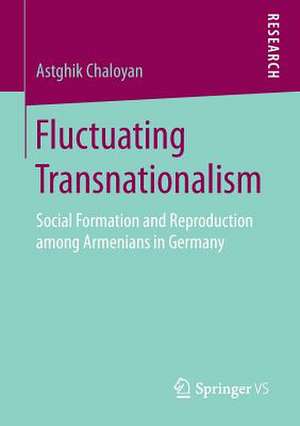Fluctuating Transnationalism: Social Formation and Reproduction among Armenians in Germany
Autor Astghik Chaloyanen Limba Engleză Paperback – 7 iul 2017
Preț: 383.93 lei
Nou
73.47€ • 78.56$ • 61.25£
Carte tipărită la comandă
Livrare economică 17 aprilie-01 mai
Specificații
ISBN-10: 3658188251
Pagini: 249
Ilustrații: IX, 253 p. 9 illus.
Dimensiuni: 148 x 210 mm
Greutate: 0.32 kg
Ediția:1st ed. 2017
Editura: Springer Fachmedien Wiesbaden
Colecția Springer VS
Locul publicării:Wiesbaden, Germany
Cuprins
Transnationalism and diaspora.- Historical background of Armenian migration, and formation of the Armenian diaspora.- Peculiarities of Armenian transnational ties.- Modes of representation in transnational social fields.- Components of belonging.
Notă biografică
Astghik Chaloyan is a scientific assistant at Georg-August University of Göttingen, Institute for
Sociology, and Max Planck Institute for the Study of Religious and Ethnic Diversity.
Textul de pe ultima copertă
This book concerns various modes of being transnational among a diasporic population—Armenians in Germany—by drawing parallels between the first and second generation migrants. It puts forth the questions as to whether or not, and which kind of transactional activity/ties/practices survive over generations, and to what extent transnational engagements influence self-identification and the sense of belonging. It also examines how various modes of transnationalism, in turn, impact the sense of belonging. The book fleshes out new perspectives and interpretations of transnationalism, by revealing specific aspects of border-spanning ties, and by showing that connections to the country of origin do not necessarily need to be sustained or intensive in order to survive. They can, instead, fluctuate depending on various factors but still have the “right” to be called transnational.
- Transnationalism and diaspora
- Historical background of Armenian migration, and formation of the Armenian diaspora
- Peculiarities of Armenian transnational ties
- Modes of representation in transnational social fields
- Components of belonging
- Scholars and students of migration, transnationalism and diaspora studies, sociology
- Diaspora associations, migration officers
